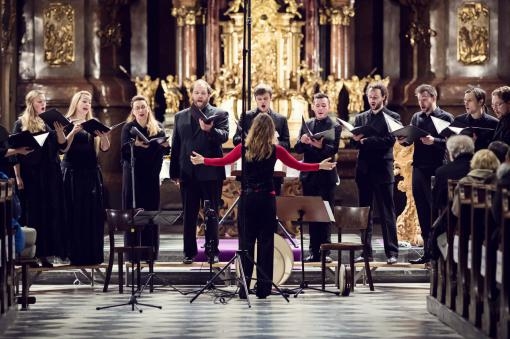If you are a fan of and listener to ancient music then you will certainly have heard of the Czech Ensemble Baroque and its artistic director Roman Válek. The ensemble works with historically informed interpretations from older stylistic periods, mainly the baroque and classical. The main strength of the orchestra lies in the performance of large musical-dramatic works. Among their recent achievements is the artificially created oratorio Příběh o Kristu (The Story of Christ) created from thematically linked works by the composer Heinrich Schütz. The ensemble has also paid great attention to the works of František Xaver Richter, whose Requiem and passion oratorio Deposizione dalla croce di Gesu Cristo were part of the most recent recording by the orchestra.
The concert with the title !Ay, Santa Maria!, which was heard in the Church of St. John in Brno was however far from being a major orchestral-vocal work. The Czech Ensemble Baroque is made up of an orchestra and a choir. In the case of this concert the ensemble departed from its normal line-up with only the choir in the church under Tereza Válková with several accompanying instruments. Rather than classical or baroque works only those by Spanish Renaissance composers were performed.
The concert was primarily focused on pieces by Tomas Luis de Victoria, but works by other Renaissance masters were heard – among the most significant composers we can place mainly Cristóbald de Morales, Francisco Guerrero and Gaspar Sanz. However what began as serene church music was transformed into something much less traditional, lively and rhythmic. The change was however gradual and at the same time unexpected. And for that reason it was both enchanting and disarming.
The work O Virgo Splendens from the codex Llibre vermell de Montserrat began the concert programme. The first work could already be heard from the entrance to the church. In the works in the introductory part there were small scenic elements – distant voices, the ceremonial arrival of the signers in the front part of the nave of the church before the next song, and finally the arrival of the choirmistress herself immediately before the piece Virgen bendita sin par by the composer Pedro de Escobar. Occasional changes in tposition of the choir extended the range of sound of the ensemble. Among the most appealing works was the Salve Regina by Sebastián Durón, in which two choirs were placed against each other – one in the front part and the second in the rear part of the church near to the entrance.
As far as the performance itself is concerned, there is no need to save on the superlatives – the choir members were able to achieve a rare balance between the dynamic shading of individual voices, distinctive expression and especially the coherence of the resulting sound. In particular the ends of the phrases were polished to a delicate balance. All of the singers exuded modesty and a simple joy in the performance of music. This made the concert a pleasant alternative and counterbalance to the occasional grandiosity that disturbs the otherwise calm waters of historically-informed performances.
The accompaniment was a chapter in itself. In many songs the baroque guitar and theorbo appeared, changing their role depending on the type of work. We listened to a harmonious accompaniment of solo and choral music, as well as purely guitar and solo works. The guitarist and theorbo player Richard Závada alongside the percussionist Radek Tomášek enriched what until that time had been rather a vocal concert. Despite the fact that in the famed (among guitarists) work Canarios by Gaspar Sanz there were some small technical shortcomings, the interpretation was sufficiently precise and thoughtful that these were not important.
The programme for the evening also changed at the end of the concert. Purely classical European style works with intricate counterpoint gave way in the programme to music undeniably South American influences. At first quietly, gradually but more and more clearly, dramatic, dance, homophonic and especially indigenous musical elements dominated. Bit by bit the representation of rhythmic instruments in the orchestra increased. By the end the music was reminiscent of Negro spirituals from the early 20th century. Were it not for the initial high setting of the bar, it would have appeared that the homophonic parts, genial rhythms and the relaxed feel of the choir were only trying to hide technical shortcomings. And at the same time it was in these complete stylistic transformations that the choir showed that it has still not reached its limits.
While some might say that the almost frivolous music of some of the composers does not belong in a church (furthermore during Lent), the Czech Ensemble Baroque choir showed that it is not always important to adhere to austere solemnity and grace. If a concert maintains a high level of interpretation and broadens musical and human communication from the most serious and most humble supplications to lively, almost dance-like forms, it will enchant even the sternest critics. I freely admit that I fell under the spell of the Spanish Renaissance composers as performed by the Czech Ensemble Baroque.
Livre vermil de Montserrat: O Virgo Splendens, Anonym: Ay Santa Maria, Pedro de Escobar: Virgen bendita sin par, Francisco Guerrero: Gabriel archangelus, Cristóbald de Morales: Magnificat Octavi Toni, Regina Caeli, Gaspar Sanz: Canarios, Tomas Luis de Victoria: Ave Maris Stella, Ne timeas, Maria; Regina Caeli, Sebastián Durón: Salve Regina, Anonym: Dios italaçonantzine, Sancta Maria, Juan de Araujo: Los coflades de la estleya, Czech Ensemble Baroque Choir
































No comment added yet..